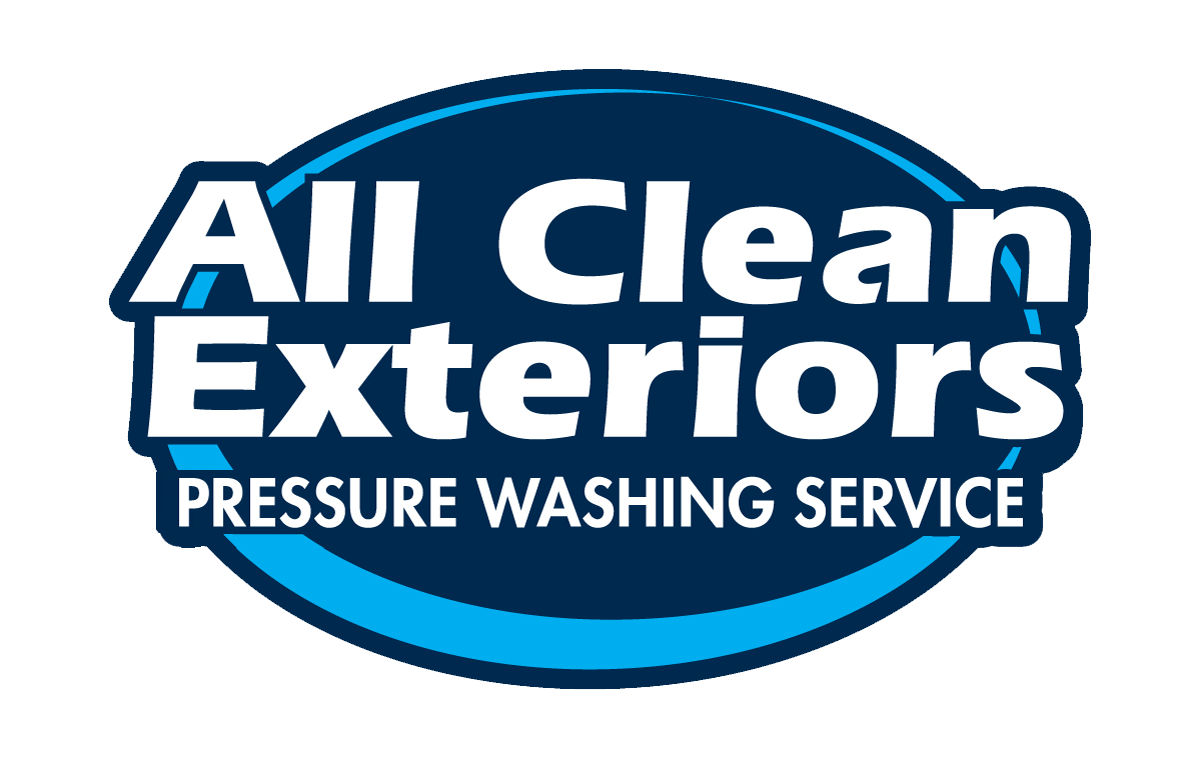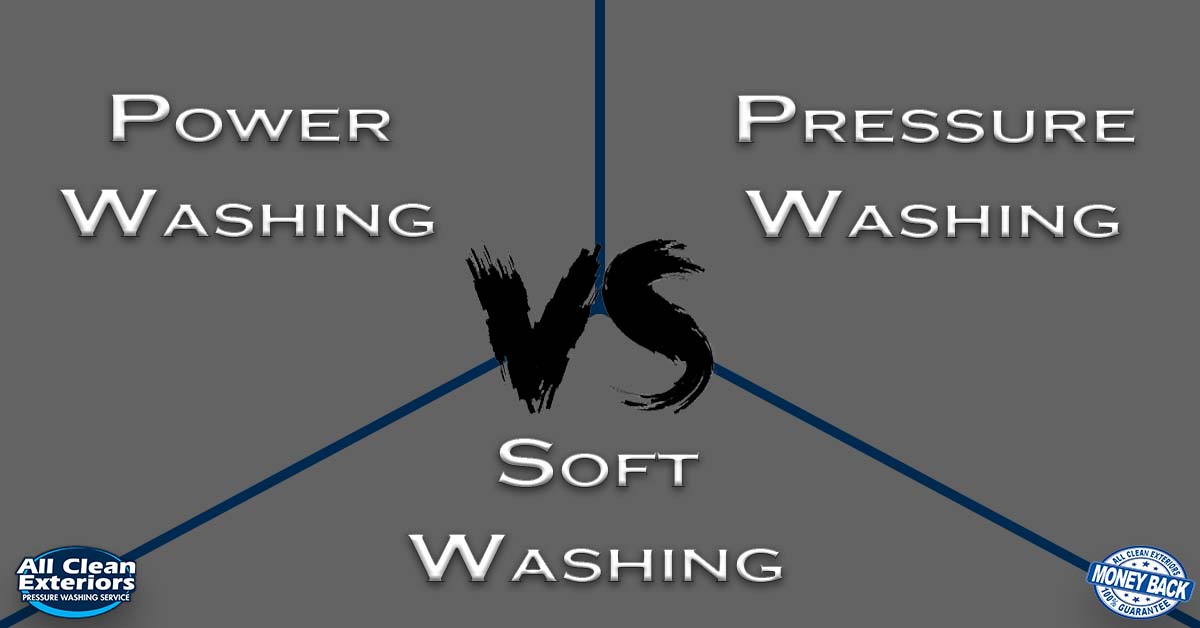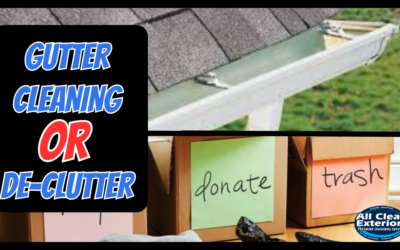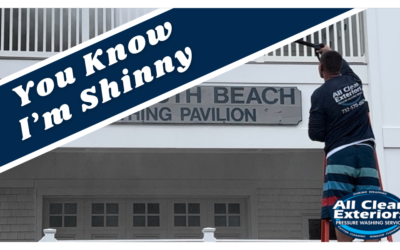Are you wondering what the difference between soft washing, power washing and pressure washing is? If you couldn’t tell by the title, you came to the right place. Although the difference may seem pretty self explanatory, the real question is when you should use each one. Different surfaces require different pressures, and the most popular one may actually surprise you.
If you jumped the gun a little bit and are wondering, what is power washing? Take a look at this in-depth article first.
So now you are wondering why so many different companies and ads use terms like power washing, pressure washing and soft washing. Well guess what, you are not alone. There are many common misconceptions about what each one of these mean. This article is going to cover the difference between the three of them and the best time to use each one. By the time you finish reading, you will be able to tell all your friends how smart you are, kind of.
Power Washing
Let’s start with power washing. What exactly does this term mean? Power washing is a general term used to define the combination of power and water to clean a surface. This term is often compared to pressure washing. The two terms are commonly used interchangeably but an argument can be made for some differences. Power washing is often used more generally and can include either using high pressure washing or soft pressure washing to accomplish the goal.
Some people will say that power washing uses hot water and pressure washing does not. This isn’t exactly true. There are specific hot water power washing machines that do require the use of hot water. However, there are also power washers that will use whatever water you provide it with. Also, the water pressure on these machines can often be changed to high or low. Unfortunately, that is an example of the problems with the internet. Many people commonly talk about their opinions and not facts.
Pressure Washing
Pressure washing is fairly self-explanatory. It is used to describe cleaning a surface with water at a high PSI (pounds per square inch). When using high pressure washing, the surface will be cleaned simply by the water blasting away any debris or mold. This technique does not require any detergents or cleaning solutions.
Safety first. Pressure washing is an incredible way to clean those old, tough stains on a hard surface. However, there are some dangers that go along with using a pressure washer. A residential pressure washer can reach in excess of 5,000 PSI. For comparison, your average garden hose uses roughly 40 PSI. Even the CDC (Centers for Disease Control and Prevention) has issued warnings such as “The strong spray from a pressure washer can cause serious wounds that might first appear minor.” So yes, a pressure washing can cause substantial injury if not used properly.
The best surfaces to use pressure washing on are the ones that are hard and contain deep pores. Concrete is the most common but again, not always. Here at All Clean Exteriors, we almost always use soft washing.
Soft Washing
The thing that makes soft washing confusing is that it is actually accomplished utilizing a power washer. This causes many people to assume that all power washing is high pressure. The truth is that more often than not, it’s soft washing. With the assistance of a cleaning detergent, soft washing will accomplish the same level of cleaning as pressure washing. However, it will prevent any damage from occurring due to the higher PSI.
As you probably understand by now, soft washing is the safest option. There is less risk of injury and damage to your surface. But be sure to use the correct cleaning detergent too. Soft washing MUST be used when cleaning a roof and vinyl siding. Both of these surfaces are extremely delicate. A couple more examples include most siding such as wood, cedar shake or stucco. Don’t let this confusion scare you, there are many benefits of power washing.
When is the Best Time to Power Wash?
This question does not have a specific answer. Many variables play a role in the best time to power wash a surface. Depending on your area’s climate, the most common time is the spring and summer. This provides excellent weather and is just before the summer entertaining season. Power washing in Monmouth County is most commonly done from the end of March until the beginning of October. You can certainly power wash your home in the winter, but we don’t always recommend it. An important part of house washing, is to allow the sun to assist in the drying process. A lack of sunlight causes mold and mildew to grow on your surface and turn it green. If your house is turning green, please read this article and even watch the accompanied video before it is too late.
Can I Power Wash my own House?
Yes, of course you can. As I have covered, there are many different techniques and methods that go into power washing. The equipment includes various different settings and nozzles. The pressure can be high or low. There are different types of cleaning detergents, There is an old saying in life that goes; “you get what you pay for.” This means that using the cheapest option usual isn’t the best. Take a look at our in-depth comparison of do-it-yourself vs professional power washing for more information.
Conclusion
The answer to these age old questions can sometimes seem to be confusing. Many online resources will state different answers for each of these terms. They also provide confusing answers on when to use each one. I will be the first one to tell you, it should almost always be soft washing. You can not go wrong by using a cleaning detergent and less pressure. Just be sure to rinse the area to prevent hurting plants and animals.
Although high pressure washing is more exciting, it is often much more risky. As the industry leading power washing service in Monmouth County, All Clean Exteriors almost always use soft washing. This ensures providing incredible results while maintaining the integrity of the surface. Pressure washing will often result in a very clean but damaged surface. Also, many surfaces will appear fine after a pressure washing. But you may have removed outer layers of the surface, which protect it. This will cause costly repairs and a lot of regret.
Check out our work if you are looking for roof cleaning and live in Monmouth, Ocean or Middlesex County, NJ or the surrounding area.





